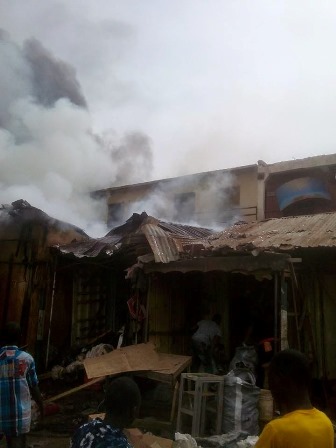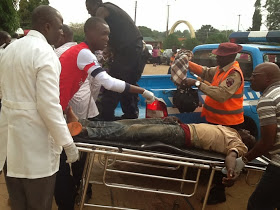 Jos market bombing. May 20 2014.World Watch Monitor
Jos market bombing. May 20 2014.World Watch Monitor
More than 100 people have been killed in three bombings in a span of four days, all suspected to be planted by Boko Haram, in the Nigerian city Jos.
On May 24, three people – including the suicide bomber – were killed when a blast reportedly detonated prematurely, missing its target of more than 400 football fans packed in the Jos View Centre to watch European Cup football. The bombing took place near the centre along Bauchi Road, in a predominantly Muslim settlement.
On May 20, two blasts killed at least 118 people, most of them women and children.
The twin blasts occurred as Nigeria’s Senate voted to extend the state of emergency to the states most affected by Islamist insurgency.
The twin blasts occurred as Nigeria’s Senate voted to extend the state of emergency to the states most affected by Islamist insurgency. Nigerian military has reportedly arrested a suspect in connection with the bombings. The arrest was announced on May 28.
The first bomb was hidden in corn on a cargo truck that exploded at about 3 p.m. in Terminus market. Thirty minutes later, a minibus exploded.
The two bombs were detonated during the local rush-hour, with several commuters caught in the subsequent fire. Most of the victims were women who were buying food for their evening meals. Initial reports confirmed at least 118 casualties, an estimated 80 per cent of them women.
Nigeria’s largest church network, the Christian Association of Nigeria, condemned the attacks.
‘‘The perpetrators are not sensitive to human life. These women that sell tomatoes for a living, how can you just go and destroy them like that? There are some that were left with only one leg, with only one hand. We strongly condemn this barbaric act,” said Rev. Musa Asake, the association’s national secretary.
Asake said he suspects Boko Haram is behind the attack, and urged the government to provide security in congested areas – especially where locals work.

World Watch Monitor
n
The Nigeria Fellowship of Evangelical Students confirmed the death of seven Christian students who were killed in a bus that was in the same area of the first explosion. The students had just finished their medical school lectures and were returning to their hostels.
‘‘My daughter went for lectures as usual,” said Humphey Nwafor, whose daughter, Francisca, 20 and a Nigeria Fellowship of Evangelical Students leader, was killed in the attack. “After the bomb blast, I started searching in most of the hospitals but I couldn’t find her until yesterday morning [May 21]. I saw her body at the university teaching hospital mortuary’’.
Another victim of the attack, Christopher, lost three of his family members, he told World Watch Monitor.
‘‘My wife went to the market to buy some food. After the market, she went to visit her uncle in a nearby hospital,” said Christopher, whose last name is being withheld for security reasons. “She was walking along the market, just after her visit when the bomb exploded, killing her and our 5-month-old baby girl, and also her sister who was with her’’.
‘‘We don’t know the real intention of the attackers. But from all indications, I think it is a religious issue, because if those who are behind the attack have some problem with the government, they should have attacked the government, instead of targeting people who have nothing to do with politics,’’ he said.
Hours after the bombings, rumours circulated across the city that Christian youths were planning to attack Muslims in revenge. This prompted appeals for calm from religious leaders.
‘’It is sad that Plateau is back on the news again after a long period of silence and peaceful co-existence, businesses are flourishing … and Plateau is speedily becoming a centre of peace and tourism,” Rev. Soja Bewarang told World Watch Monitor. ‘‘Our enemies are not happy that we are at peace … our hearts are sorrowful as a result of (the) sudden death of key Plateau patriots and while as a country we are mourning the abduction of over 200 school girls at Chibok.”
Since the attack, a number of Christian campus-based groups have engaged in dialogue with leading Muslim youth groups to reflect on the situation and promote a peaceful co-existence.
‘‘We resolved to go to our respective areas and try to stop anybody from organising revenge actions as a result of the bomb blast. We resolved to encourage people to live in peace and to rather show sympathy with those who have lost their loved ones and support them in whatever ways we can rather than [harbouring] anger, revenge and bitterness,’’ Rev. Gideon Para-Mallam, regional secretary of the International Fellowship of Evangelical Students, told World Watch Monitor.
Some students are donating blood for the surviving victims.
Religious tensions in Central Nigeria, especially in Plateau State, have also been aggravated by economic struggles over access to natural resources between the native Berom, who are mainly farmers, and the Fulani herdsmen who migrated from the far north of Nigeria.
A history of Boko Haram’s religiously motivated violence in Jos
Situated in the heart of Nigeria, Jos is known for its gentle climate, which has attracted many tourists and foreign workers. However, in recent years the capital of Plateau State has come to highlight the ethnic and religious divisions of Nigeria.
Since 2009, the extremist Islamist group Boko Haram is believed to be responsible for thousands of deaths in its efforts to rid northern Nigeria of its Christian presence and impose Islamic law.
In January 2010, an attack targeting a church led to widespread sectarian violence. Many Christian villages on the outskirts of Jos were attacked, more than 1,000 people died, 20,000 were displaced and houses and property were destroyed.
Previous bombings claimed by Boko Haram have trigged revenge attacks from Christians in Jos. Most notably, in February 2012, one of the insurgents drove a car packed with explosives into a church, killing himself, two worshipers and wounding 38 others. In response, a group of Christian youths beat two Muslims to death. A month later, another suicide bomber attacked a Catholic Church, killing three people. Christian youths again responded in reprisal killings, resulting in the death of 10 Muslims.
Rev. Para-Mallam, active in mediation efforts between religious communities in the Plateau State, said any attack in Jos especially generates attention because historically most of the Christians that have been attacked in northern Nigeria flee to Jos as a safe haven.
The city is somewhat a refuge for Nigerian Christians as it is home to the headquarters of most of Nigeria’s main denominational churches and Christian organisations.
Para-Mallam said Boko Haram has consistently been driving Christians from the northern parts of Borno State by acts of violence.
‘‘In the 18 local governments of northern Borno, we are losing a Christian presence. For example, Chibok, which is 80 per cent Christian, is located in Southern Borno – where nearly 300 hundred school girls were recently kidnapped – constitutes the only remaining Christian stronghold in Borno State today,” he said.
‘‘There is no denying the fact that both Muslims and Christians are killed,” Para-Mallam said, “but the extermination of Christians from Borno is only a matter of time if the present situation is not arrested.’’
The U.N. Security Council committee monitoring sanctions against al-Qaida has recently added Boko Haram to its list, with an arms embargo and asset freeze.
